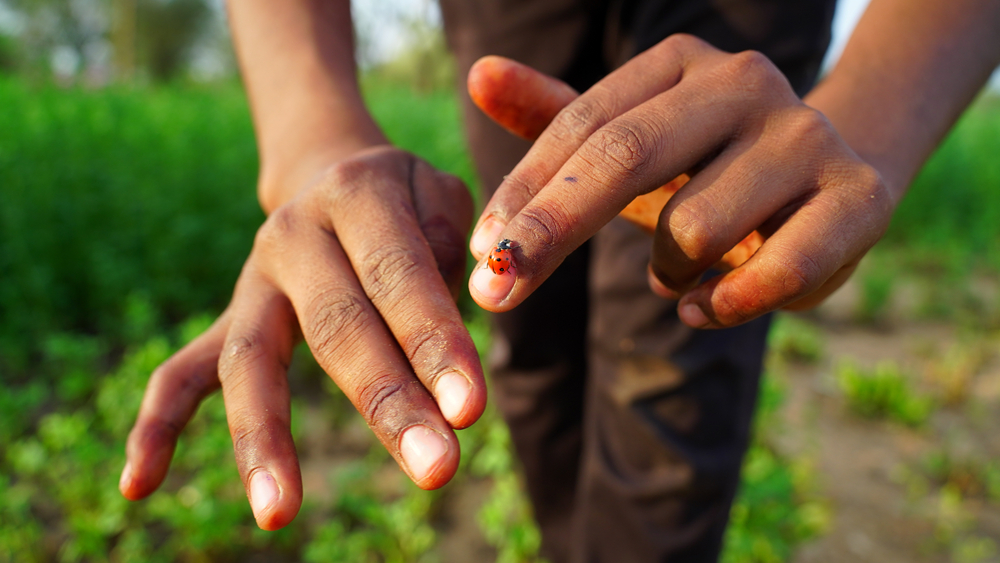There’s more to a successful garden than just the plants you pick out; it’s also about the beneficial bugs that call it home. These modest beings are critical to the health and balance of your garden environment. They are nature’s allies, from pollinators to pest predators. Your garden may become a thriving, pest-free paradise if you provide the right conditions for these helpful insects to thrive.
Earthworms
Earthworms are unsung garden heroes. These wriggly miracles not only aerate but also fertilize the soil. Their tunnels provide crucial oxygen and hydration to plants by creating channels for air and water. They decompose organic debris, providing beneficial nutrients that nourish your garden. Offer earthworms a feast of leaf litter or your home compost mix to entice them. Avoid compacted soil and heavy tilling since these will disrupt their habitat. Plant a cover crop to ensure a warm habitat for these important creatures over the winter.
Ladybugs
Ladybugs are a gardener’s dream, with their lovely spots and ravenous hunger for aphids. These adorable insects are nature’s pest controllers. Plants with flat blossoms, such as carrots, dill, and yarrow, or colorful marigolds and calendula, will attract ladybugs. Provide a feeding source for purchased ladybugs when introducing them to your garden. Refrigerate the container of ladybugs for a few hours to calm down the inhabitants before releasing them at dusk or morning near blossoming plants or aphid-infested areas.
Praying Mantises
Praying mantises are formidable predators that attack garden pests with zeal. While they can be harmful to other beneficial insects, they are extremely effective at eradicating pests like aphids, caterpillars, and mosquitoes. Introduce these hunters to your yard only if you have a serious pest problem. Hang the container on a tree in a shaded spot, preferably near the pests that praying mantis feed on, to release the eggs. To protect the eggs from ants, avoid placing the container on the ground.
Green Lacewings
Green lacewings and their larvae are effective allies against a variety of garden pests. Aphids, caterpillars, mites, and thrips are preyed upon by these fragile insects. Encourage lacewings by planting pollinator-friendly plants in a pesticide-free garden. Their preference for nectar and pollen will keep them around all season. Welcome these lace-like winged wonders and watch them guard your plants gently.
Ground Beetles
Don’t be fooled by their name: ground beetles are the unsung heroes of the night. These nocturnal predators prey on a variety of pests such as snails, caterpillars, and weevils. Mulch the surface of your garden to provide a safe haven for these ground dwellers. Perennial plants and decomposing materials provide them with shelter and food. At dusk, go through your garden and gently relocate ground beetles from logs or other hiding places to areas where pests live.
Soldier Beetles
Soldier beetles, commonly known as leatherwings, are useful garden companions. These colorful insects not only pollinate flowers while feeding, but they also eat grasshoppers, caterpillars, and aphid eggs. Plant flowers with compound blossoms, such as Queen Anne’s lace, marigolds, and zinnias, to greet them. Their presence in your garden refuge offers both beauty and balance.
Assassin Bugs
Assassin bugs may appear menacing, yet they protect the balance of your garden. These adept predators use venom to control pests such as aphids, leafhoppers, and caterpillars. Maintain a diversified habitat by keeping bushy vegetation and weed-infested areas. Take care not to confuse them with pests and accidentally kill them. Allow these inconspicuous defenders to thrive alongside your plants.
Bees
Bees are essential allies in every thriving garden. They aid in the growth of herbs, vegetables, and flowers by acting as pollinators. Plant native flowering plants that produce a lot of nectar to attract them. Enjoy the beauty of clover and dandelions, which are important food supplies for bees. Create a water oasis in a small dish with marbles to provide a safe haven for bees to hydrate. Protect their breeding grounds because different bee species have varied needs.
Parasitic Wasps
With their tiny ovipositors, parasitic wasps play an important role in pest management. These tiny marvels bury their eggs inside hazardous insects like aphids and caterpillars, naturally reducing their abundance. Grow a garden with a variety of flowering plants to attract these beneficial wasps. They will contribute to the harmony of your garden as they feed on pollen and nectar.
You may nurture a harmonious and sustainable ecology by cultivating a garden that attracts beneficial bugs. Accept the beauty of these tiny superheroes while they contribute to the health of your plants. You can appreciate the splendor of nature’s equilibrium and watch your garden bloom into a refuge of life and color with its presence.










